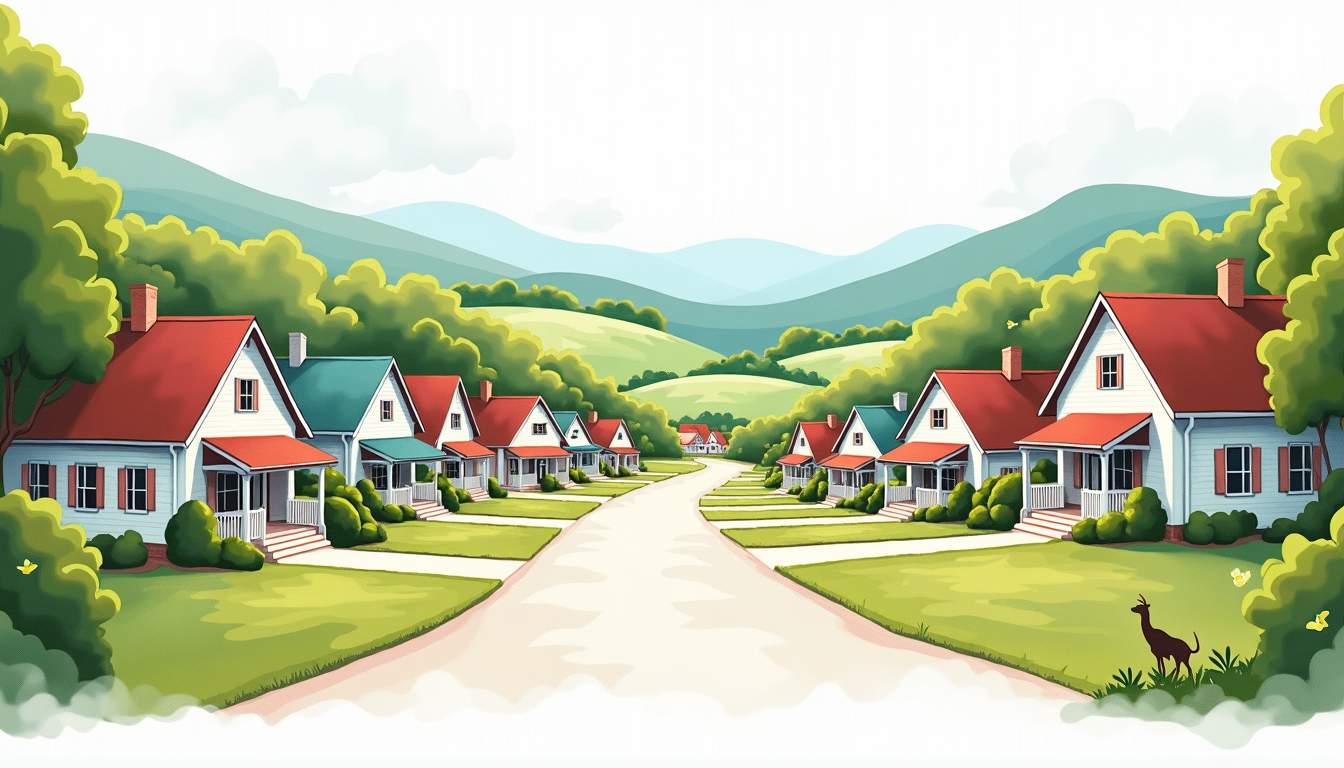
Retirement brings a chance to choose a place that matches lifestyle wishes: slower pace, access to healthcare, outdoor recreation, culture, and a strong sense of community. East Tennessee combines scenic mountain views, four-season mildness, and towns with different characters — from lively cities to quiet mountain enclaves. This guide walks through top communities for retirees in East Tennessee and provides practical buying tips to make a confident move.
East Tennessee's appeal to retirees starts with the landscape: rolling foothills and the Great Smoky Mountains provide year-round opportunities for hiking, birdwatching, scenic drives, and peaceful vistas. The region's climate is generally moderate, offering warm summers and winters that are cooler than much of the South but milder than northern states. That makes it attractive to people who want seasonal variety without extreme cold.
Beyond scenery, East Tennessee offers a lower cost of living and housing prices that often stretch retirement savings further than coastal areas. Cities like Knoxville and Chattanooga combine medical centers, arts and dining scenes, and transportation options, while smaller towns deliver strong social networks and slower rhythms. Tax-wise, Tennessee does not tax wage income, which can be advantageous depending on individual retirement income sources.
Knoxville blends access to major medical facilities, an active downtown, and neighborhoods that range from historic to newly developed. The University of Tennessee contributes cultural events, lectures, and athletic activities that appeal to many retirees. Suburbs like Farragut and Bearden offer walkable shopping and dining, while riverfront redevelopment downtown has added parks and trails that encourage outdoor living.
Housing in Knoxville includes condos, ranch-style single-family homes, and attractive new builds in planned communities. Property taxes are generally reasonable compared to many metropolitan areas, and commuting distances are usually short, reducing daily stress. For retirees who want urban amenities without the density of a large city, Knoxville hits a comfortable middle ground.
Just south of Knoxville, Maryville and neighboring Alcoa provide a small-town atmosphere with easy access to larger-city services. These towns have historic downtown districts, community events, and well-maintained parks. The area tends to attract retirees seeking quieter streets, friendly neighbors, and access to the Great Smoky Mountains National Park without the crowds of tourist hubs.
Real estate options include single-level homes that are well-suited to aging in place, and newer developments often feature accessible designs. Local health systems offer solid primary and specialty care, and nearby airports make visiting family and friends convenient. Maryville's community programming and volunteer opportunities also make it simple to stay engaged.
Chattanooga has undergone a renaissance over the past decade, emerging as a favorite for retirees who enjoy outdoor recreation and a lively cultural scene. The Tennessee River and surrounding ridges create a backdrop for kayaking, biking, and hiking, while downtown offers museums, performance venues, and a growing culinary landscape. The city's focus on walkability and green spaces is appealing for those who want an active daily life.
Housing choices vary from historic bungalows to modern condos with maintenance included — a plus for retirees who prefer less exterior upkeep. Healthcare systems in Chattanooga are robust, and the city often ranks well for quality of life metrics. Those looking for a balance between outdoor adventure and city amenities will find many options here.
In the northeastern part of the region, Johnson City and the Tri-Cities area (including Kingsport and Bristol) are known for solid medical centers and access to Appalachian scenery. For retirees who prioritize healthcare access and appreciate a smaller-city feel, the Tri-Cities deliver. Cultural offerings include community theaters, historical sites, and university events that add regular programming to the calendar.
Real estate markets here are often more affordable than larger metro areas, and neighborhoods vary from quiet subdivisions to lakefront and riverfront properties. The pace is calmer, and community organizations are active, providing volunteer and social opportunities that can make retirement fulfilling.
Communities bordering the Great Smoky Mountains attract retirees who want nature close by. Gatlinburg and Pigeon Forge are more tourist-oriented and can be busy seasonally, but surrounding towns and mountain neighborhoods offer peaceful settings, cabin-style homes, and access to national park trails. For someone wanting to trade city lights for starry nights and long walks, these areas are worth considering.
When choosing a mountain home, consider seasonal access, road maintenance, and home systems that handle humidity and wildlife. Mountain locations offer unique lifestyle benefits, but require planning for maintenance and emergency access during winter or severe weather.
East Tennessee's housing market is diverse. In urban centers, condos, townhouses, and single-family homes are common. Suburbs and smaller towns offer ranch-style homes, patio homes, and neighborhoods developed with retirees in mind. Prices vary by location: downtown properties in Knoxville or Chattanooga will command higher prices, while outlying towns and rural properties can be more affordable.

Equity-minded retirees often look for single-level floor plans or homes with room for accessible modifications. Gated communities and active adult developments exist, but many retirees also choose conventional neighborhoods for the sense of integration with families and long-term residents. Evaluate ongoing maintenance costs, homeowners association fees, and the potential for renting or selling in the future when estimating affordability.
Financing a retirement home can come from savings, pensions, Social Security, home equity lines, or reverse mortgages. Each option carries trade-offs: tapping home equity may reduce inheritances but preserve cash flow, while a reverse mortgage can provide tax-free income but affect estate plans. Consulting a financial advisor who understands local housing costs and retirement income strategies is valuable before making large decisions.

Tennessee does not tax wage income, but it does tax certain investment income depending on legislation changes, and property taxes vary by county. Homestead exemptions and other local tax breaks sometimes exist for seniors or disabled homeowners, so investigating county-specific rules is important. Healthcare costs, insurance premiums, and potential long-term care expenses should also be factored into a realistic retirement budget.
Look for single-floor living or plans that make future mobility changes easy: wider doorways, minimal thresholds, and bathrooms designed for grab bars. If the ideal home lacks these features, assess the cost of modifications. Maintenance-free or low-maintenance segments — condominiums or communities with yard services — can free time and energy for hobbies and travel.

Proximity to hospitals, urgent care centers, and specialty providers matters much more in retirement. Drive times to medical facilities, availability of in-home care providers, and local emergency response times are important practical considerations. Visit medical centers to understand their services and ask neighbors or local forums about experiences with local healthcare.
Spend extended time in a potential community during different seasons. Weekdays and weekends can feel different; tourist towns can be bustling in summer but quiet off-season. Attend community events, try local eateries, and check walking routes. Many people rent for a few months before buying to ensure the lifestyle matches expectations.
Choose agents who know the retirement market and the nuances of neighborhood differences. Local agents can recommend homes that meet accessibility needs, point out upcoming developments that may affect quality of life, and provide realistic market timelines. Real estate attorneys or settlement agents familiar with Tennessee law can streamline the closing process and clarify property disclosures.
Moving in retirement often involves downsizing possessions and rethinking priorities. Start early to sort belongings, considering what brings joy or serves a purpose. Smaller homes reduce upkeep but require smart storage solutions and thoughtful furniture choices. Selling or donating items can also help financially by offsetting moving costs.
Social connectivity is equally important. Join clubs, volunteer groups, or classes that align with interests to build a local social network. Libraries, community centers, and continuing education programs offer low-cost ways to meet people. Keeping an active lifestyle through walking groups, fitness classes tailored to older adults, or gardening can improve both physical and mental well-being.
Safety considerations include neighborhood crime rates, floodplain designations, and road conditions during winter storms. East Tennessee has varied weather; while extremes are less common than in other regions, severe thunderstorms and occasional ice storms can affect mobility. Review home insurance options and ensure adequate coverage for wind, water, and liability risks.
Long-term planning should include a durable power of attorney, advance healthcare directives, and an updated will. If staying in the home long-term is the plan, consider future caregiving needs and proximity to family or assisted living options. Mapping out a care plan in advance reduces stress if health needs change.
East Tennessee offers a spectrum of retirement lifestyles: city-centered convenience, small-town charm, and mountain seclusion. Choosing the right place depends on priorities like healthcare access, social opportunities, and desired proximity to nature. By focusing on accessibility, realistic budgets, and community fit, retirees can find a home that supports an active, comfortable, and fulfilling next chapter.
Take time to research neighborhoods, consult professionals for financial and legal guidance, and try living in a community before buying when possible. Thoughtful preparation helps make the move smoother and the retirement years more enjoyable.
Experience the perfect blend of luxury, comfort, and active living at Tennessee National, a premier gated community nestled in the scenic beauty of East Tennessee. With amenities like a Greg Norman Signature Golf Course, private marina, waterfront dining, and vibrant social clubs, Tennessee National offers an unmatched lifestyle tailored to retirees seeking both relaxation and engagement. Whether you prefer a move-in ready home or a custom build, explore living options designed to fit your retirement dreams. Schedule a private tour today and begin your next chapter surrounded by nature, community, and resort-style amenities.